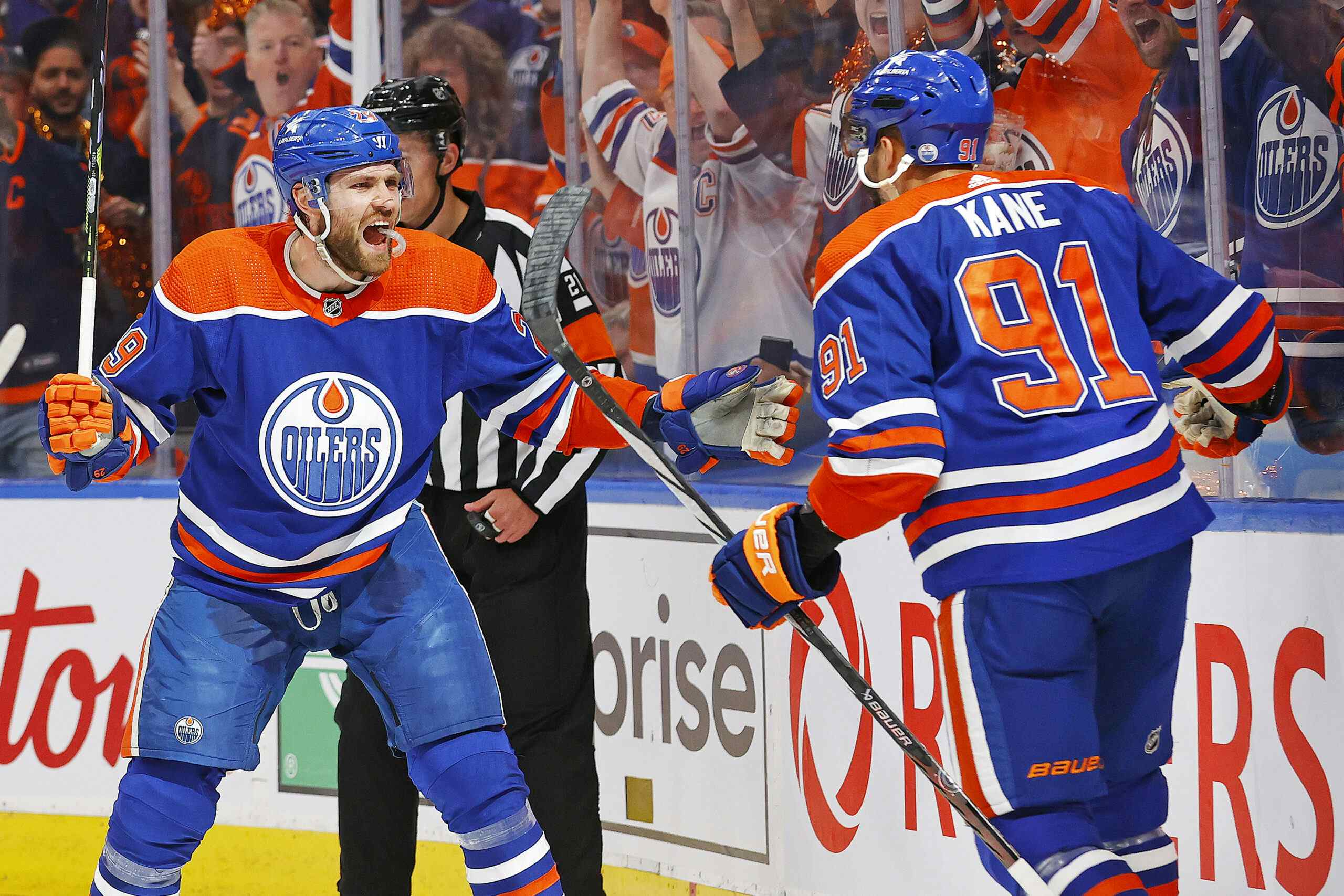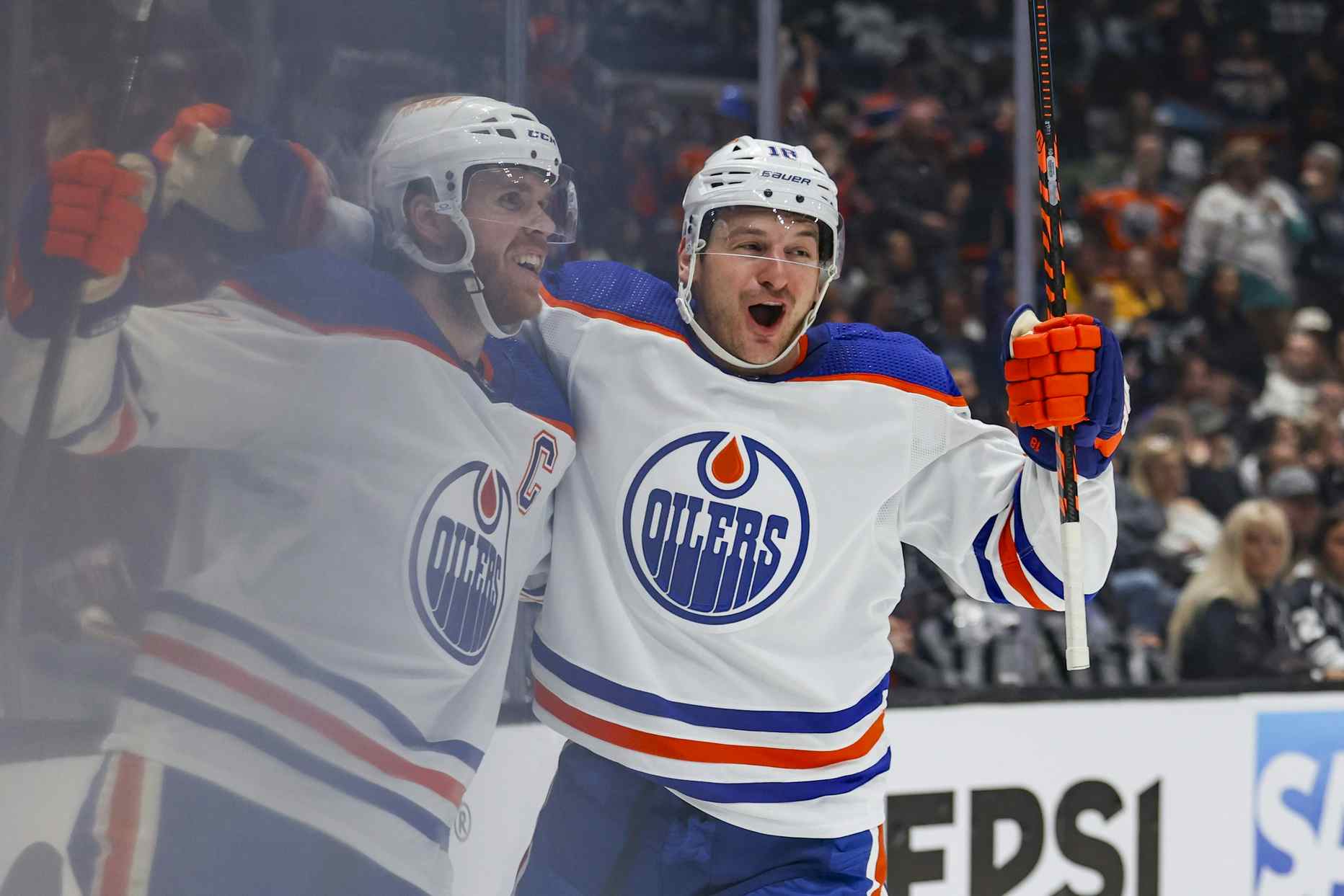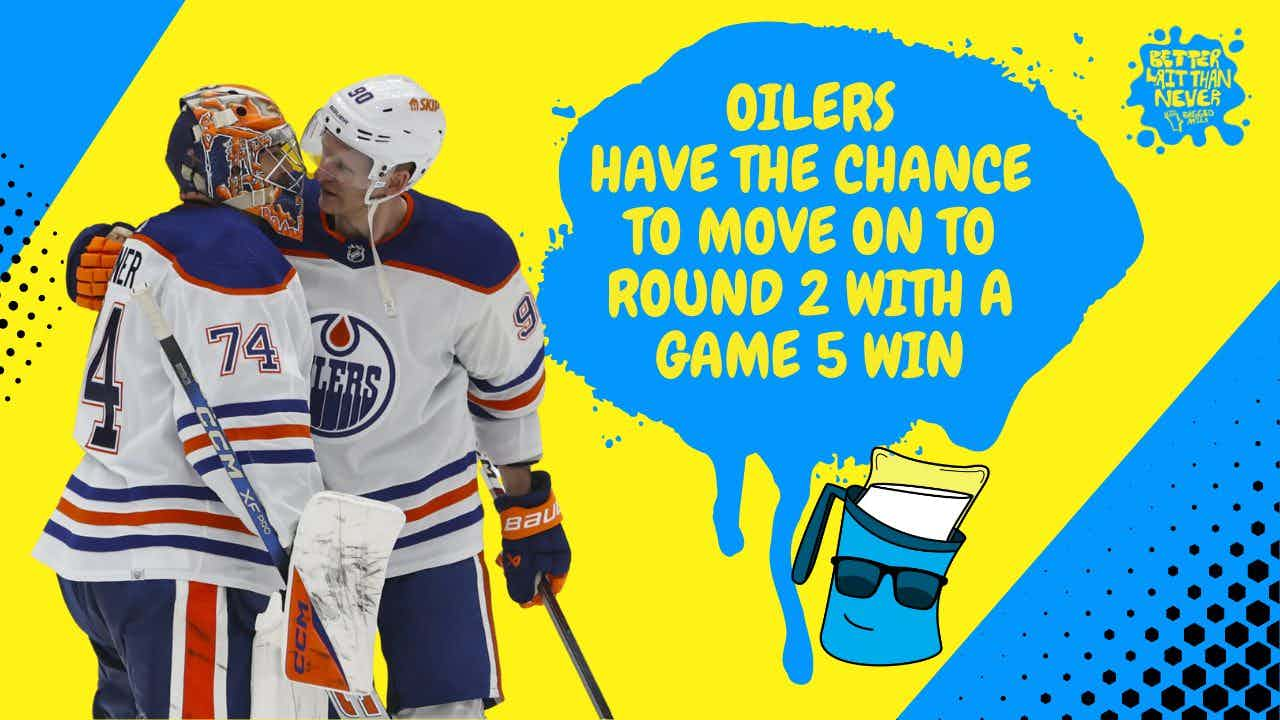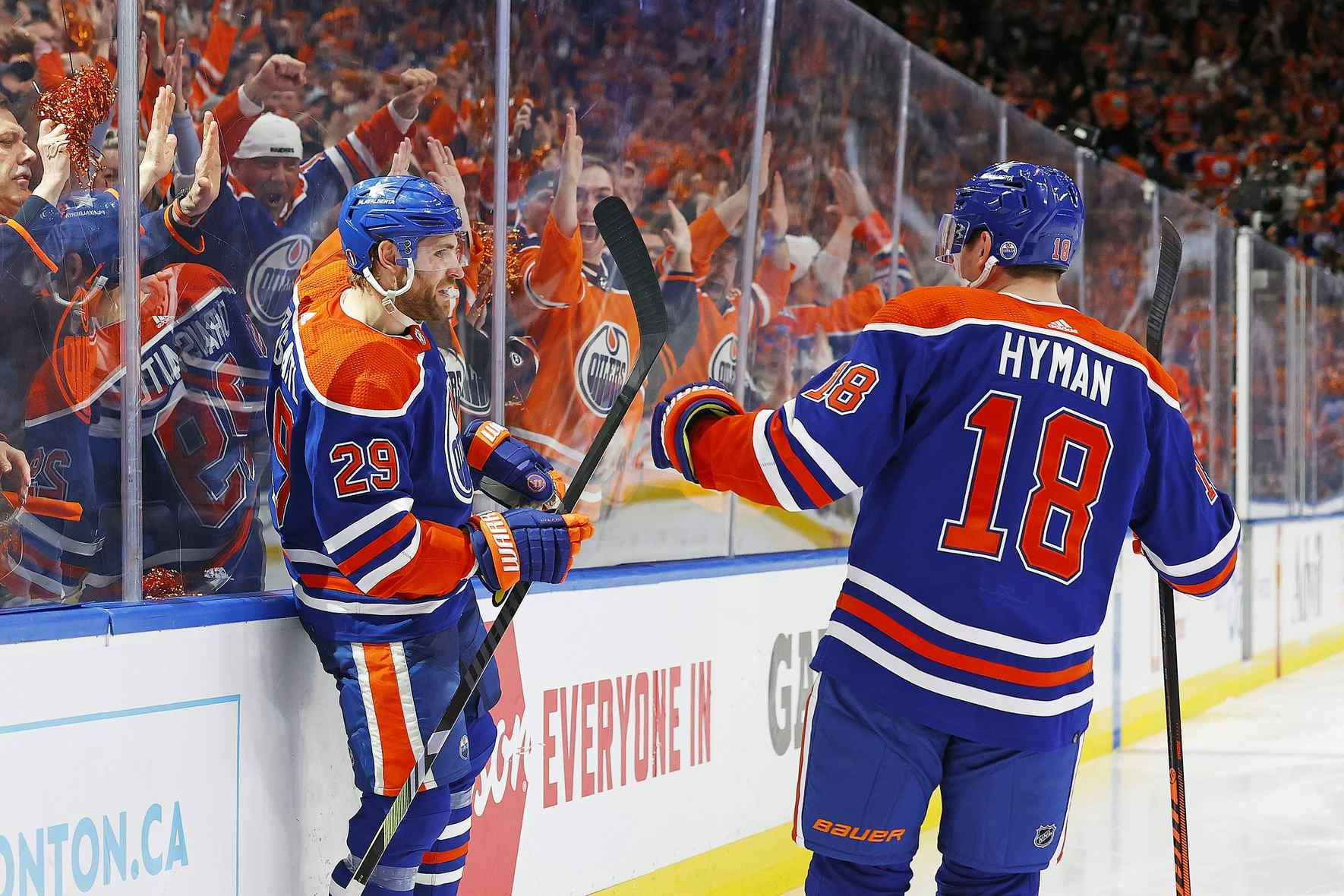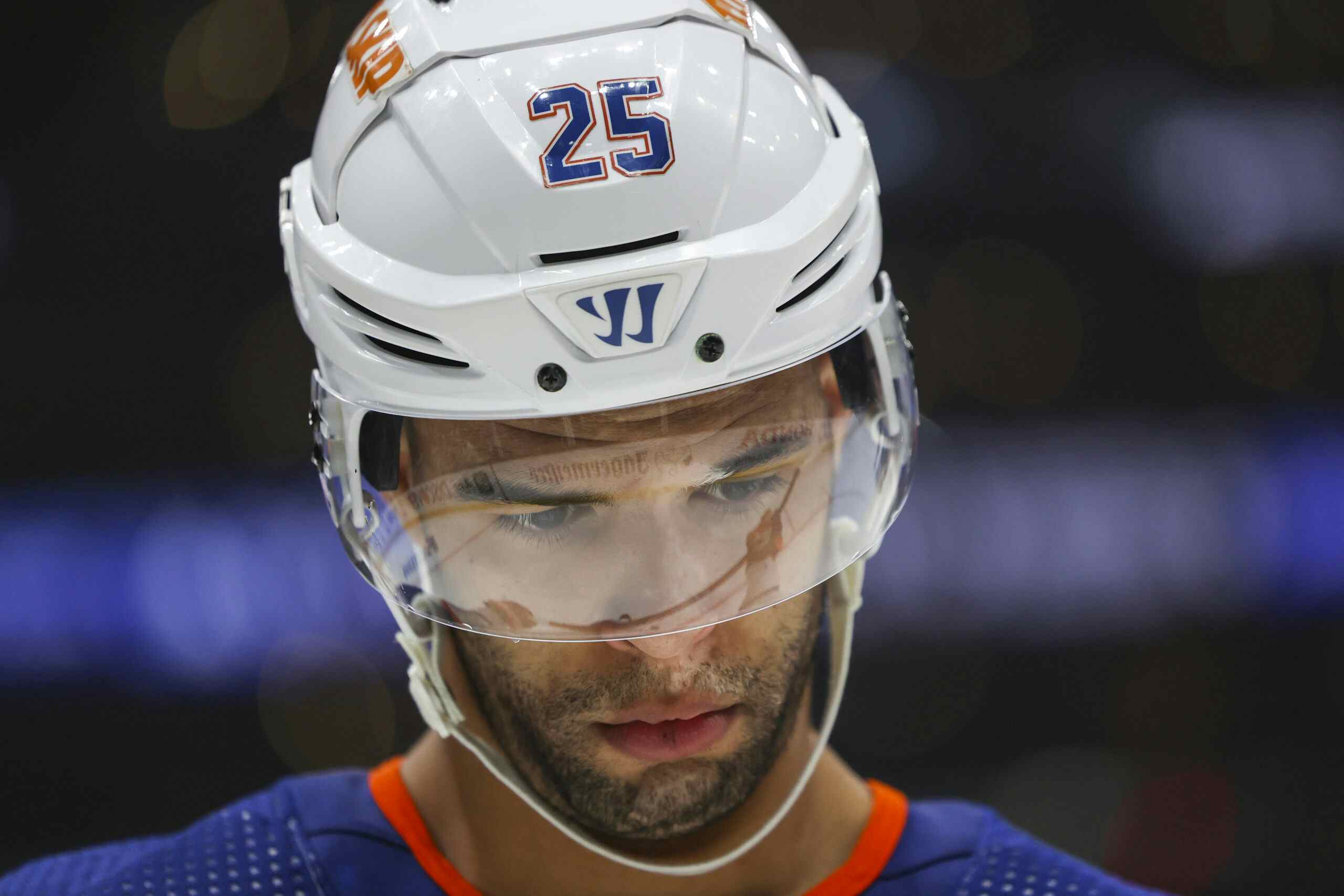EAKINS: “I WANT TEAMS TO FEAR US”
By Jason Gregor
10 years ago
Dallas Eakins will spend this week in Edmonton talking to Steve Smith and Kelly Buchberger to see if they will be part of his coaching staff. He will also sit down with Craig MacTavish and get a sense of the roster, the strengths and weaknesses, and start planning for next season.
Eakins is very intense, he’s a fitness freak and when I spoke to him on my radio show yesterday afternoon, it was clear he is a man with a plan. He wants teams to fear the Oilers skill, their speed and their physicality. Of course, the latter hasn’t been a strength of the Oilers for years, and Eakins gave us some insight on how he plans to change that as well as they style and system his team will play next season.
Eakins was very direct with his responses, and he gave Ryan Rishaug and I a pretty clear insight into how he plans to make the Oilers competitive.
Eakins was very direct with his responses, and he gave Ryan Rishaug and I a pretty clear insight into how he plans to make the Oilers competitive.
Jason Gregor: What do you see as the strengths of your new team, just based on the players you have and do you build around them or do you make them play your system?
Dallas Eakins: Well, it’s going to be a two-way street I think. Listen, I’m not going to take away much from these players where we never want to take away, especially with our young players, speed and skill and the way that they see the game.
A lot of these players have massive offensive upside. There will be a little bit more accountability with the puck, and firmly accountability without it. One should never take away from another. I don’t buy into the premise that when you play better defensively that your numbers suffer. You’re on offense when you have the puck and you are on defense when you don’t and those simple rules are going to be in effect.
What we need to do, is that we need to develop these guys a little bit further. We also need to get the right people around them who can not only complement them, but also teach them how to play and how to win in the NHL. So we have a lot going on here, but I’m certainly excited to get it going.
Ryan Rishaug: You talk about accountability, can you maybe just give us a little bit of a window into the type of accountability that you’ve had in the past?
Eakins: I will get to these players, individually and over time I will develop a relationship where I get to know them. This isn’t a sit down, me ask them a bunch of psychological questions, it’s a constant conversation that will probably start in my office, or by the coffee machine, or in the weight room, or on a bike, or wherever it may be. It’s through those conversations I find out what motivates them, inspires them, what their triggers are, how they respond.
I’ve had players where I knew that if I screamed at them quickly they responded right away. I’ve had players where I knew that if I screamed I would lose them in the game, or lose them for a week or two. And that’s not that you’re looking to be soft, or looking to play favourites, you don’t. All of these kids have been brought up differently, they’ve had different experiences, they have different personalities, and if you’re going to treat them all the same, then you’re doing your team a terrible disservice.
We’re going to treat them all the same, when it comes to work ethic and discipline and we’re going to treat them all differently when it comes to motivating and inspiring their personal goals.
MOTIVATION
Gregor: What are your thoughts on motivation? How much of it is on the coach, how much is on the player and how often do you need to initiate it?
Eakins: Well the balance is that you just feel it. It’s not a calculated thing where it’s ‘okay I’ve got to scream at this guy once every two days.’ There’s just a time for it and there is a time not to. I think if you get the right group together as a team, they will motivate each other. That’s the perfect scenario that they’re always holding each other accountable, not wanting to let down your teammates, disappoint a teammate, to show your team that you’re going to do everything or anything you can every night or any given day to get better.
Accountability is huge for a coach and it can’t just be with your bottom two lines. There has got to be accountability right from your number one player right through the 23rd guy on your roster, and it’s got to be consistent, then the players catch on real quick. You don’t want it to be, ‘oh well he’s allowed to do that but I can’t,’ so that’s something that we have to work through. It’s something that the players have to understand, but I will have the rules in place on how we’re going to deal with it.
Rishaug: What’s your coaching philosophy on the role of the, not necessarily the nuclear heavy weight, but the aggressive player who can play, but also look out for the skill on the ice, and how do you employ those types of players?
Eakins: I still think that hockey is a game of fear, and before we even get to that part, I want other teams to fear our skills, fear our speed, and fear our physicality. Is there going to be fighting in hockey in the future? I believe that there will be. It’s a high contact sport, these guys are in each other’s faces. There’s a lot of testosterone out there and that is just going to lead to a fight.
I think that it’s important, especially with a young group, to have a certain level of toughness that these kids can continue to develop in a place of no fear. So I do have a place for it. I think that it’s an important part of the game, not the most important, but certainly I never ever want our team to be nervous or in fear and that’s something that we’ve got to go through as we add pieces to this.
Is it necessary to get a guy who just fights? Well maybe it isn’t. But maybe we can have some guys who are good checkers, who are good players, who can back it up as well. It will all depend on the roster spots, and what’s available and how we see the team makeup going forward.
Gregor: The Edmonton Oilers haven’t been an overly physical team for quite some time. Do you think that you can make players more physical or do you have to go out and find more players who are naturally physical?
Eakins: I think you can have players who maybe it doesn’t come naturally to, to simply compete harder for the puck or finish their check on a regular basis. You are certainly not going to make a guy who doesn’t have it in their DNA, that meanness in their DNA, to go out and hammer on guys. It’s not going to happen.
We’ve had a couple of guys come through the Leaf organization where we tried to turn them into something that they weren’t, and I realised that you just can’t do it. It’s no different than taking a guy who is challenged skill wise, and bring him into your office and say, ‘hey we need 40 goals out of you.’ That’s not going to happen, he doesn’t have it in his DNA and it works the other way too.
So we do want to have a commitment from our players that they will compete hard, that will be nonnegotiable. They will finish their checks, always, but we are certainly going to have to build some nastiness in here around them.
LINE JUGGLING

Rishaug: Do you have a philosophy on continuity within your lines as a head coach?
Eakins: Well in the American League it’s different, you’ve always got guys going up, coming down; there’s always movement. Your lines are constantly changing. With the forward lines, I firmly believe in pairs. You usually find the third guy amongst a couple of guys who feed off of each other. You can insert or take away the third guy in the line and that’s how it usually goes. Hey, if a line is working and it’s working for a long time and it suddenly goes south, then we need to find out why it went south because it’s already been proven that it works.
So we’ll look for those pairs early. If we do find a line that’s clicking, we want to keep it fresh. But if for some reason, it does start to go south, there’s something else going on there because their skill level is the same, their fitness levels are the same, they’re all the same size, nothing has changed other than something isn’t working now. That’s something that’s up to the coaching staff to get in there and find that out.
On defense I like pairs that you really need to be comfortable with your partner and that’s a place where I do need to just get the six guys in there, especially the top-four where they know where each other are all of the time without looking or saying a word.
Gregor: What skillset do you need amongst your top-six defensemen? I know you need a mix, but will your onus be on guys who can move the puck?
Eakins: Well you need both. It’s one of those things where as a defenseman I always ask them, ‘what’s your position?’ and they say, ‘defense’ and I say ‘that’s right, the first job is to defend.’ We need that out of all of our defensemen. However, the way that the game is now with the quickness and the skill level, you’ve got to be able to skate. If you are challenged a little bit with your skating, you’ve got to have a firm handle on your angles and your limitations and you like guys that can handle the puck. Listen, one pass and we’re out, that’s the best way to kill these tenacious forechecks now.
We want guys that can put the puck on the tape. We don’t want to be a team that’s banging the puck out off of the glass all of the time, we want clean breakouts. And then, as always, if there is danger, and the other team has done a good job on a certain forecheck, and we can’t make a pass that we recognize the danger and we just get the puck out of our zone so that the forwards can get skating after it.
Rishaug: Would this opportunity in Edmonton be unique as far as coaching experience goes for you, given the amount of young, very high end, high draft pick talent offensive players that you have. Have you experienced that in any way, shape or form as a head coach before?
Eakins: No not as a head coach. You have your skilled guys, maybe you’ve got three of them at the American Hockey League level. The only place I was up front and close with it was when I was an assistant coach with the Toronto Maple Leafs and I was a part of a group that was coaching Mats Sundin and those types of guys.
So it’s certainly going to open a door to try to try some things differently, especially on the power play, odd man situations. The other side of this is if we can get some of the offensive guys, the guys who can see the offensive side very well, and we can get them very, very fit so that they can handle extra minutes. We also want them to learn that checking side of the game, so now they can be an offensive force when killing a penalty as well. There are a lot of things that you can do if you can get these guys playing on both sides of the puck. And that’s where the test is going to lie and it’s going to take some time to get this plan in place. I think that once the guys get comfortable with it, we can be a dangerous team, in all different kinds of ways.
Gregor: It might be too early for this, but many have wondered if moving Taylor Hall to centre would be smart. Do you think he can be just as dominant playing the wing as he could in the middle?
Eakins: It’s going to be one of these things, the first thing that I’m going to do, while I’m here this week, is to talk to our management, what they’ve seen, what Steve Smith and Kelly Buchberger think. But I think that maybe the most important conversation comes between me and Taylor. I’ll ask him where is he the most comfortable, where does he think that he can be the most productive, and then we start working through it. I can’t tell you right now where he is going to play. But we will find that spot where he is comfortable at, that we’re comfortable at, and more importantly where he will befit his teammates and we will move forward with that plan.
Rishaug: What is your philosophy, and you may have touched on this a little bit, on your skilled players being a part of the penalty kill?
Eakins: Well yeah, if they can get good at it, and if they’re committed to it, I think that they should be out there. Your skilled guys, it’s a number of things going on. They’re usually the smartest guys on your team when it comes to reading plays, they can definitely do damage when they get the puck. Your skilled guys are usually guys who can really skate, so if you can teach them how to kill penalties or if they can get committed to doing some of this dirty work on a penalty kill, and it hurts blocking shots and sacrificing your body, then that can be a way for them to up their minutes.
Usually your skilled guys are making the most money, and if you’re making the most money you had better be playing the most minutes, because you’re earning that money. So that’s where I would like it to go. That being said, if we have other guys on the other lines that are excellent penalty killers and can get the job done, then we’ll stick with them. It’s certainly an opportunity to for a guy with skill to buy in a little bit more defensively to get some more ice time.
Rishaug: Dallas, just to clarify from the press conference today, as far as the rest of the coaching staff goes, are you looking to add an associate coach, and will you also be making the call on the other two assistants. Is that where it’s at right now?
Eakins: Well yeah, that’s where we left it and listen, I just got my feet on the ground here. So I’m going to talk to Kelly and I’m going to talk to Steve and find out where they’re at here as coaches, and how they see this going forward. We are definitely in a market here to add another coach, possibly someone with some NHL experience. It’s easy to say that, it’s a little bit harder to do but I’ve got to get the lay of the land here and see what works best for our team and what I deem best for our team. So there will be a bit of a process to this, but in the end we will make our decision and move forward.
Gregor: What will you look for in those coaches? What types of coaches do you want on your staff?
Eakins: Well number one, they’ve got to be great teachers. I need the assistants to be great teachers, they’ve got to have a real firm knowledge technically, tactically to adjust mid-game right during a shift. As encouraging as I can be, there are going to be times right where I’m going to light a fire under a player, and he may not like it and I’m going to need my assistants to swing back around and put out the fire and be a real positive force.
So there are a number of things going on there, and we’ve got to get the right mix. To be honest with you, I’ve got to find out about Kelly and Steve. They might be the best two assistant coaches in the National Hockey League and I’ve got to go in and see where they’re at, and how they fit.
FINAL THOUGHTS
- Eakins reminds me of MacTavish, which is likely a reason why he replaced Krueger. Eakins will be more demanding than Renney and Krueger, and that will likely be a good thing for this group of players. I believe they need to be challenged a bit more.
- I’ve said this before, and I’ll say it again, unless MacTavish gives Eakins some better players, I doubt we will see a massive improvement from the Oilers. You can’t keep changing coaches and expect to win. The philosophy and demands of the team need to improve, and time will tell if MacTavish and Eakins are the right guys to make these changes. It is very early, but so far I’ve been impressed in how direct and decisive MacTavish has been, and I suspect we will see a new approach from Eakins when training camp starts in September.
- Taylor Hall is a left winger. He is most comfortable there, and I predict after Eakins speaks with his leading scorer he will keep him on the wing. It is time to stop talking about moving Hall to the middle. He can dominate games on the wing, and that is where he will play next year.
- Teemu Hartikainen’s decision to sign in the KHL and play for his former Finnish coach makes sense for him and the Oilers. Hartikainen needs to mature, and he needs to be more consistent if he ever hopes to play in the NHL. I know many love his size, but size means nothing if you don’t use it, and use it often. In order to make the NHL, and remain in the NHL, players need to be self-motivated. No coach can bring that out of you. They can enhance it, but the majority of motivation and drive comes from within, and at this point I haven’t seen it often enough in Hartikainen. He has the ability and skill to play in the NHL, but he can’t expect his coaches to constantly prod him to get him going. Hopefully for him and the Oilers, he finds that this year in the KHL.
- The Stars signed Sergei Gonchar for two years at $5 million a year. Gonchar is 39 years old. I wonder how that will impact the market for Mark Streit? Streit turns 36 in December, but he’s averaged 0.67 points-per-game the past five seasons, and he’s an elite puck mover. Despite his defensive deficiencies, I expect he’ll get at least a 3-year deal and likely longer. Will the Oilers give him $15 million over 3 years? They might have to if they want to sign him.
- The Blackhawks have been the best team all season, so I’ll stick with them and take them to win in 7 games.
RECENTLY BY JASON GREGOR
Recent articles from Jason Gregor


